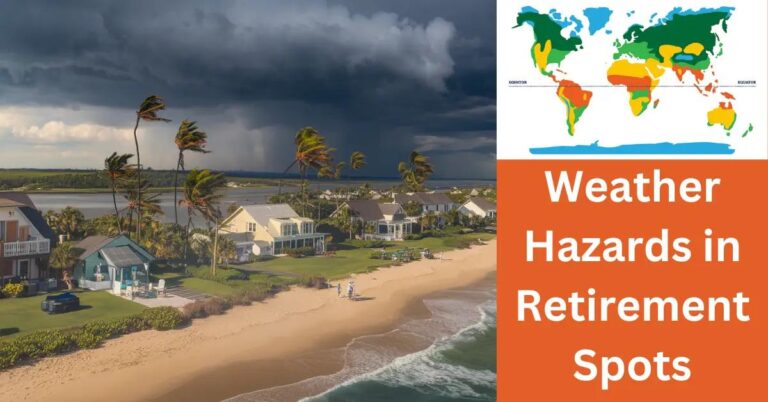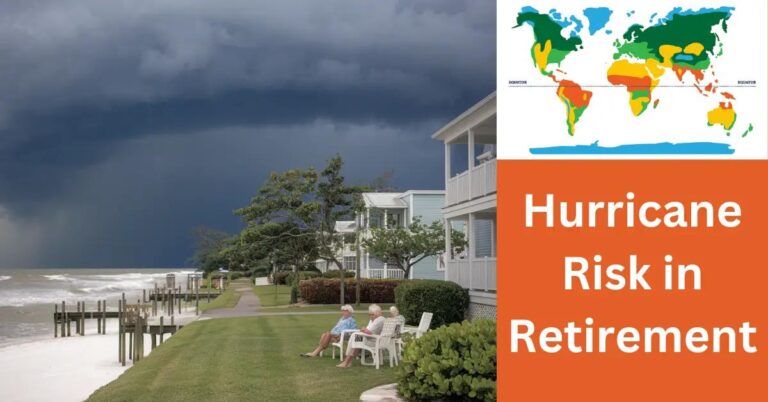TL;DR:
- Coastal weather offers mild winters, sunny days, and health benefits from sea air.
- Risks include hurricanes, floods, erosion, high insurance, and maintenance costs.
- Retirees should plan for emergency situations and consider areas with reliable transportation.
- Coastal towns offer a strong sense of community, local events, and recreational activities like golf, fishing, and water sports.
- Seasonal changes require lifestyle adjustments and flexibility.
- Financial considerations include high living costs, especially during tourist seasons, and potential impacts from climate change.
- Renewable energy could reduce expenses.
- Popular retirement spots with favorable climates include California's coast.
- Engage in community and environmental preservation for a fulfilling retirement experience.
Dreaming of a retirement by the ocean? The coastal allure pulls many with its sun-kissed sands and whispering waves. But is coastal weather the right fit for you? Let's delve into the perks and hiccups of oceanfront living. You'll find how mild winters bring joy, yet hurricanes might make you think twice. Are you ready to discover if this seaside dream aligns with your lifestyle?
How Does Coastal Weather Affect the Benefits of Retiring by the Ocean?
Choosing to retire by the ocean has been a dream for many. But why is that? One major draw is the weather. Coastal climates often have mild winters. This means less snow and fewer icy roads to worry about. Mild winters make it easier to stay active and enjoy outdoor activities like walking or biking.
Many coastal areas also see lots of sunny days, perfect for golf or beach picnics. Sunshine boosts our mood and keeps us healthy. The warmth invites you outside to explore nature and meet others in the community. This leads to stronger friendships and a happier retirement life.
Breathing the sea air offers real health benefits. Sea breezes improve air quality, helping those with asthma or allergies breathe easier. Living by the water also reduces stress. This can enhance both mental and physical health. The sound of waves is calming and helps some people sleep better at night. Many folks find this improves mood and reduces anxiety.
Living on the coast fosters a strong sense of community. Coastal towns often have thriving local events, like fairs or concerts. These bring people together and create lasting memories. Being part of these events helps us feel included and valued. It’s a real plus when thinking about retirement.
Water activities bring added health rewards. Swimming and fishing keep the body fit and offer fun ways to stay active. These activities help us stay engaged and maintain enthusiasm for learning new skills.
Consider what makes a coastal town so fun to retire to. Does mild weather and a lively community appeal to you? If so, oceanfront living might be the perfect choice. You can enjoy a vibrant and health-focused lifestyle. With peace of mind and easy access to nature, the benefits are plentiful.
What Are the Downsides of Coastal Weather for Retirees?
Coastal living offers beauty but brings some risks. You should know the risks of hurricanes and severe storms. These storms can damage homes and disrupt peace. Insurance costs can rise too. Coastal areas often require special storm insurance, which can be expensive.
Floods can pose a big threat. Flooding damages property and raises costs. Coastal homes might need more maintenance. You could face costs from erosion too. Erosion eats away at land near homes, causing problems.
In summer, the heat and humidity can feel unbearable. The weather can make simple tasks outdoors hard. You might need air conditioning constantly, which adds to your bills.
Where is the best weather to retire in the US? For pleasant conditions, places like California’s coast are popular. They offer fewer storms and milder climates. However, weigh the costs and risks before choosing.
Talking to other retirees helps too. On Reddit, retirees discuss coastal retirement pros and cons. They share stories of storm seasons and hot summers. Knowing others' views helps you decide if coastal living suits you.
Emergency plans are very important. Preparing for extreme weather keeps you and your property safe. Make sure you’re ready to evacuate if needed. This includes packing a go-bag and knowing where to go.
In summary, retiring by the coast has drawbacks. Think about the weather risks, costs, and impacts on daily life. By planning well, you can enjoy the coast, despite its challenges. Always stay informed and prepared for the weather’s impact. If you weigh these factors carefully, you can make a choice that suits your lifestyle and needs.
How Do Seasonal Coastal Changes Impact Lifestyle and Well-being?
Would you ideally like to retire to a beach? Answer: Many choose beaches for the weather and activities.
Living by the coast means adapting to changing seasons. Even by the sea, weather changes. You may enjoy cool breezes in spring and warm sun in summer. Winter can be mild but still cooler than expected. With these coastal weather changes, your daily routine may shift. Adapting to coastal seasons requires flexibility.
Coastal living offers exciting sports like water skiing, sailing, and fishing. These activities depend on the season. You may find that certain activities are better during specific times of the year. Such variety keeps you active and healthy.
Gardening is another favorite coastal activity. The salt air and mild climate let you grow a range of plants. Some plants thrive in coastal areas. Seasonal shifts can impact your garden, so adaptability is key. This can be a satisfying hobby that connects you to nature.
How does seasonal tourism affect community resources? Tourism seasons can bring both hustle and abundance. When tourists flock in, local businesses thrive. However, resources like parking and services may get stretched. Managing lifestyle changes with coastal weather shifts involves adjusting to these patterns.
In coastal areas, community life experiences waves of visitors. This influx can change the atmosphere and availability of amenities. It is vital to engage in community activities and make social ties. So, when seasonal tourism influences the area, you feel more grounded.
Overall, living by the sea requires balancing nature’s cycles. Each season brings new recreation opportunities and lifestyle adaptations. By embracing these changes, you can enjoy the seaside perks, keep active, and stay healthy.
What Financial Considerations Exist for Retirees Living by the Coast?
Have you ever wondered what state is best financially to retire in? Answer: Alabama and Mississippi are often noted for lower taxes and living costs. However, every state has different benefits and drawbacks. When thinking of coastal living, Florida comes up a lot. Yet, did you know its costs can surprise some? The state has no income tax, which is great. But its higher real estate taxes can be a challenge.
Living by the sea seems relaxing, but coastal areas come with their own economic challenges. You may face higher insurance costs due to coastal risks. Hurricanes and flooding aren't just weather talks—they impact how much you pay to stay safe. That extra insurance can add a big chunk to your budget.
Home maintenance is another key element. Salt air and moisture can affect homes faster. You might need more regular upkeep and repairs. These are added costs you wouldn't face as much inland. Homes need more care, which might strain your wallet over time.
Cost of living by the sea can be higher than living inland. Local economies take advantage of tourist seasons, which could jack up prices. Groceries, dining out, and even services can cost more at peak times, affecting your budget.
Let's talk climate change's impact on property values. Rising seas may alter a home's worth. Make sure to research these risks to protect your investment. It's essential to weigh such considerations when looking to retire near the water.
Every choice has a cost. Weigh these financial aspects to understand if coastal life fits your dreams and budget. Explore more on Coastal Retirement Planning to make informed choices.
How Can Retirees Prepare for Environmental and Infrastructure Challenges?
Preparing for life by the coast involves considering many factors. What are they? First, selecting a home with hurricane-proof features is crucial. Choose sustainable materials to withstand strong winds and water. Look for designs that support coastal architecture for weather adaptation. This choice ensures safety and reduces damage costs.
Now, why should retirees focus on renewable energy opportunities in coastal areas? A key factor is the abundance of wind and sunshine. Using solar panels or small wind turbines can cut energy bills. Coastal communities often support green initiatives, making it easier to join in. Plus, these solutions are friendlier to our planet.
Emergency preparedness is a must. Sea storms can be sudden. What should retirees do? Create a safety plan. Pack an emergency kit with water, food, and medicines. Stay informed about weather updates. Knowledge and preparation save lives during unexpected events.
Access to good transportation influences retiree living. Coastal towns may face limited transportation. How can this affect you? Consider your need to reach nearby cities or stores. Research the local infrastructure. Find areas with reliable roads and public transport if essential for your lifestyle.
Finally, engage with your community. Participate in environmental preservation efforts. Join local volunteer groups focused on protecting shores and habitats. Why does this matter? It helps you connect with others and improve your home surroundings.
In sum, retirees picking a coastal spot must weigh many factors. Coastal architecture helps adapt homes to weather. Emergency plans are vital for safety against storms. Renewable energy offers savings and eco-friendly choices. Check local transportation options before moving. Lastly, bond with the community through preservation efforts. Together, these actions make coastal retirement safer and more rewarding.
Conclusion
Choosing coastal retirement brings benefits like mild winters and better air quality. Social connections and health perks make seaside living appealing. However, retirees face challenges like storms and high insurance costs. Adapting to weather changes can be tricky but allows for unique activities like water sports. Financial planning is crucial due to living costs and property maintenance. Preparing for environmental challenges ensures a safer, enjoyable retirement. Ultimately, weigh pros and cons carefully. A coastal retirement can be rewarding if you plan wisely and embrace community life.












